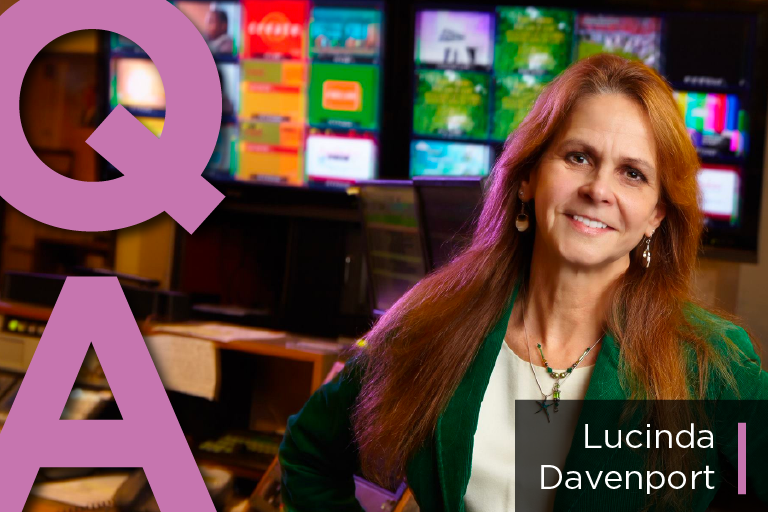University Distinguished Professor in the School of Journalism, Lucinda Davenport, Ph.D., will be inducted into the Michigan Journalism Hall of Fame on April 23, 2023. Davenport will join other reporters, editors, publishers, owners, photographers, broadcasters, and educators who have made outstanding contributions to the journalism profession. The Journalism Hall of Fame acknowledges the service and dedication of individuals whose distinguished contributions meet eligibility criteria which include integrity, courage, innovation, achievement, leadership, and contributions to the industry.
Below Davenport shares how the awards ceremony has been meaningful throughout her career.
Can you tell us a bit more about the Michigan Journalism Hall of Fame and why this honor is important?
This question probably should go to my amazing nominator, Pulitzer Prize-winner and Associate Director of the School of Journalism Judy Walgren, because she decided it was important to do. She asked if she could nominate me and then she generously took it upon herself to invest the enormous time and effort to get materials together and write a nomination letter. And she asked equally amazing colleagues to write supporting letters, which they kindly did. All my colleagues are the very best of the best.
What does your induction into the Michigan Journalism Hall of Fame mean to you?
Induction into the Michigan Journalism Hall of Fame is the result of many collaborations with a lot of co-workers, who also belong in the Hall of Fame.
My work as a journalist with innovative media technologies and on research conducted in the spirit of improving the practice of journalism has been improved one way or another by knowing others and with the support of my family.
In my administrative work, it has been the joint efforts of a director and colleagues whose endeavors in concert and with transparency make a journalism program the best in the nation. We all want and work toward success, and it takes a village. The more and different ideas that are brought to the table and discussed, the better the results. We are always learning through others in our workplace, as professionals, researchers and students, who all look at an issue or a practice with different but equally valued viewpoints.
I am inspired by my co-workers as we imagine what the future can be. Thus, this induction is something to be shared with gratefulness toward others.
What have past ceremonies been like? What do you remember about your first time at the awards?
The Hall of Fame began as the Michigan Newspaper Hall of Fame and honored journalists from 1952 to 1968. Then the committee was defunct for about 20 years. In 1985, Stan Soffin, the director of MSU’s School of Journalism at the time, went to the Michigan Press Association, and talked with David Hayhow about reviving the Hall of Fame. The committee today is made up of representatives from non-profit and diverse journalism organizations across Michigan.
Stan Soffin was a great director and a wonderful human being. He hired me about a year before I’d completed my Ph.D., which I did in 2.5 years. He invited me to attend the Hall of Fame, which was held in the lower floor of the University Club. I thought then, and continue to feel, that it is a most auspicious and exhilarating event. I continued to attend every year. And then as Director of the School of Journalism, I was honored to chair the organization. I have considered myself lucky to be in the same room with many of Michigan’s greatest journalists, listening to the most inspiring stories in the world.
What advice would you give aspiring journalists, especially those hoping to be inducted into the Michigan Journalism Hall of Fame one day?
This is what we try to do every day in the classroom . . . give advice to aspiring journalists! So that would be a lot of advice and framed in myriad ways, depending on the faces in front of us!
- Balance well the power of journalism and be sensitive in your ability to use it.
- As you say something, or report on a person, issue or event, always first consider who will hear it—who are among the many in your audience. Second, consider that there are many ways to say the same thing.
- Being a journalist comes with responsibilities to tell others what is happening with honest, accurate and comprehensive stories. Our job is not always easy, but a free press is imperative in a democratic society.
- Ethical journalism promotes public trust in journalism. Discuss those hard decisions with others before making a choice.
- Consistent negative headlines turn away audiences. Share knowledge also as much as possible in instructive, supportive and hopeful frames.
- Successful communication is composed of many parts. Communication theorist and ComArtSci professor David Berlo’s model of communication still holds true: Consider the source, the message, the channel and the receiver(s).
Also, I enjoy the advice of Mary Jane Oliver, a Pulitzer Prize-winning American poet. These might apply to more than aspiring journalists.
- “Tell me, what is it you plan to do with your one wild and precious life?”
- “You must not ever stop being whimsical. And you must not, ever, give anyone else the responsibility for your life.”
- I don't want to end up simply having visited this world.”
- “Keep some room in your heart for the unimaginable.”
What kind of legacy do you hope to leave? How does this honor contribute to it?
If I have helped to improve the practice of journalism and if I have helped colleagues and students toward success, however they define it, then that’s good enough for me.
— Connor Beeman
